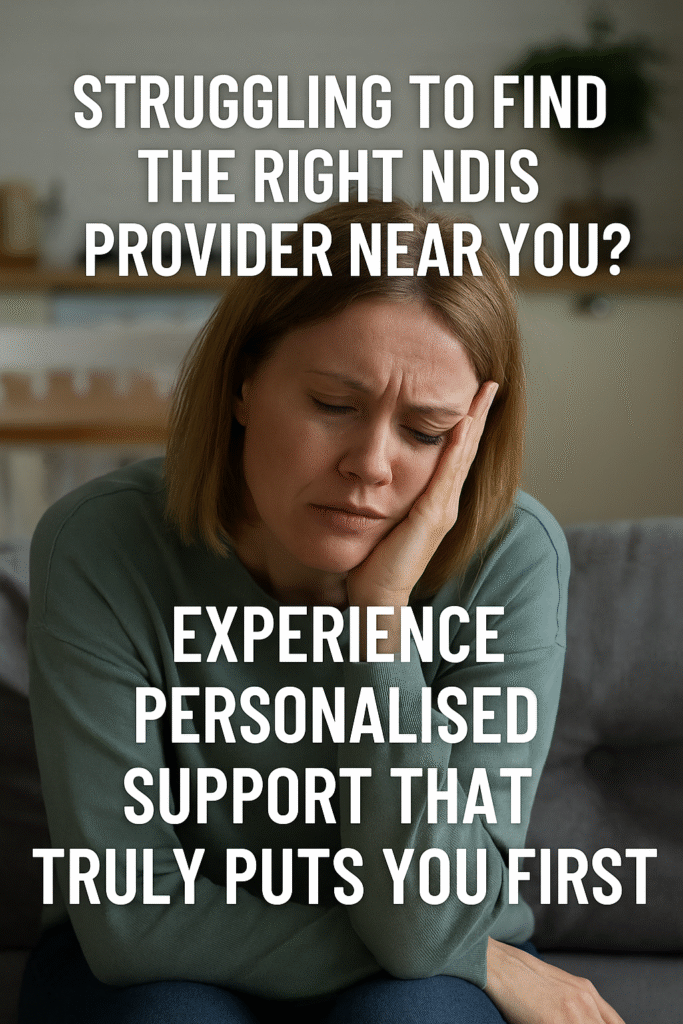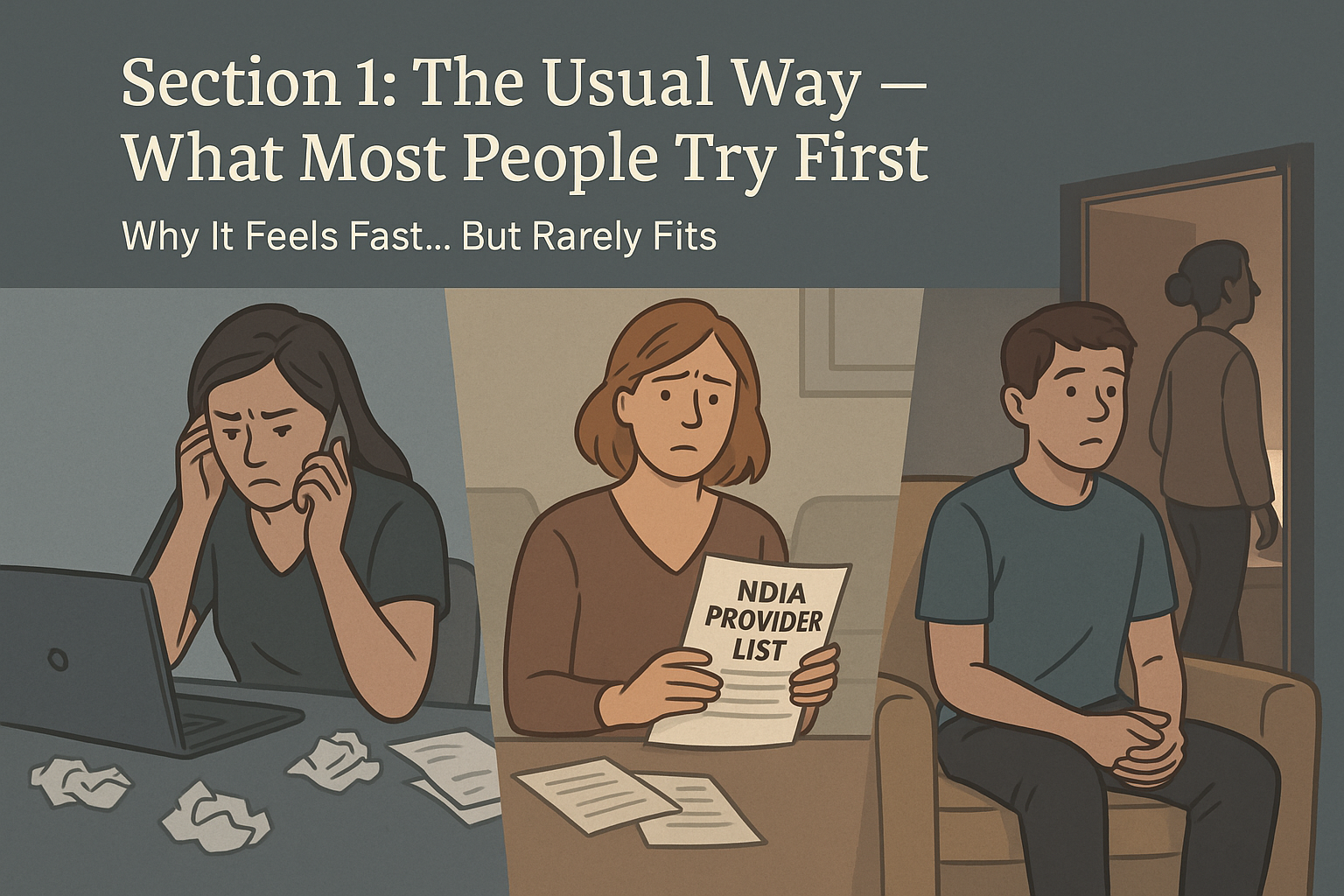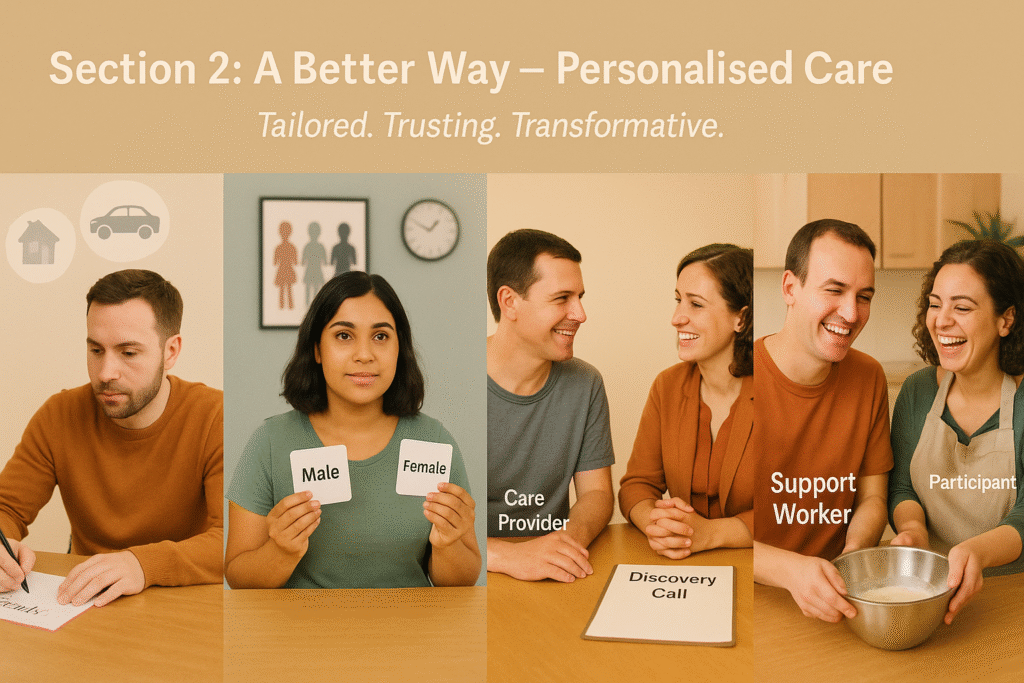Struggling to Find the Right NDIS Provider Near You? Experience Personalised Support That Truly Puts You First

Ever feel like finding the right NDIS provider is harder than getting the actual support you need?
Like you’re jumping through hoops, stuck on hold, or explaining your story over and over to people who just don’t get it?
You’re not alone.
Maybe you’ve asked yourself, “Why is this so hard?”
You’ve called five different places, filled out endless forms… and still ended up with nothing.
Or worse — you finally found a provider, but the support felt rushed, robotic, and more about ticking boxes than actually helping you.
Now you’re tired.
Mentally drained.
And wondering how long you can keep doing this.
You shouldn’t have to fight this hard for support that’s meant to make your life easier.
Let’s call it what it is: the system is messy.
And when you’re already carrying so much, finding the right provider shouldn’t be another weight on your shoulders.
What you need is real help — support that fits around you, not the other way around.
So let’s flip the script.
There is a better way — and in this article, we’ll walk through it together.
You’ll learn why the usual ways of finding support often fail… and how to choose care that actually puts you first.
Ready? Let’s get started.
Section 1: The Usual Way — What Most People Try First

Let’s be honest.
When you’re under pressure and urgently need the right NDIS provider, it’s easy to slip into survival mode. You type “NDIS provider near me” into Google, pick a few names, and start calling.
It’s like ordering from a menu when you don’t even know what half the dishes are.
1. Googling and Calling Random NDIS Providers
On the surface, it seems logical — quick, convenient, and better than doing nothing.
But here’s the problem:
Most of the providers you find this way sound exactly the same.
“We offer personalised care.”
“We listen to our participants.”
“We support you every step of the way.”
It all sounds great on paper.
But when you finally speak to someone, it often feels robotic — like you’re being slotted into a one-size-fits-all service that was built without you in mind.
Real-Life Example: Oliver’s Story — “It All Sounded the Same”
Oliver, 35, lives with a neurological condition that affects his mobility and speech.
After moving to a new suburb, he urgently needed a new NDIS provider to support him with daily personal care, transport, and basic home tasks.
Feeling overwhelmed and short on time, he did what most people do:
He Googled “NDIS provider near me” and started calling the first few results.
Each website said the same thing:
- “We offer tailored support”
- “We care about your goals”
- “We’re here for you every step of the way”
Oliver thought, “Great — maybe this will be easier than I expected.”
But once he started speaking to the providers, a pattern quickly emerged:
- One provider read from a script and didn’t ask a single question about his needs.
- Another said they could help — but only had availability on days that didn’t work for him.
- A third promised to follow up with a care plan… but never did.
By the end of the week, Oliver had:
- Spoken to five providers
- Filled out three intake forms
- Repeated his story over and over
…and still had no support in place.
It felt like calling a helpline that kept passing him around — without ever offering real help.
He realised that although every provider claimed to offer “personalised care,” the process felt anything but personal.
Why It Matters
Oliver’s experience is far too common.
When you’re under pressure, it’s tempting to choose what feels fast and easy — but that often leads to more stress, confusion, and wasted time.
The issue isn’t your effort.
The problem is the approach.
And that’s exactly why a more thoughtful, personalised system is needed — right from the start.
2. Relying on NDIA Recommendations
You trust the system.
You use the official provider lists or take advice from your Local Area Coordinator. It feels safe — even sensible.
But here’s the issue: those lists aren’t personalised.
They’re just a collection of names — not tailored recommendations based on your unique needs.
So, you spend hours calling providers who:
- Don’t offer the support you’re looking for,
- Have no availability, or
- Aren’t taking on new clients at all.
It ends up feeling like a game of roulette with your care — and your wellbeing is the bet.
Real-Life Story: Isabelle — “I Thought the List Would Make It Easier”
Isabelle is a mother of two, caring for her teenage son who has autism and high support needs. When their previous NDIS provider relocated, she turned to what she believed was the most reliable source — the NDIA’s official provider list.
She received a list of names from her Local Area Coordinator and began making calls.
But reality hit quickly.
- One provider specialised in early childhood services — not teenagers.
- Another only supported participants who could attend centre-based programs.
- A third sounded promising but had a six-month waitlist and wasn’t taking new clients.
After a week of phone calls, repeated explanations, and filling out multiple forms, Isabelle still didn’t have the help her family urgently needed. She felt like she was going in circles — using a system meant to help her, but getting nowhere.
“I trusted the list because it felt official,” she said.
“But I learned the hard way that official doesn’t mean personal. My son’s needs were never part of the equation — it was just a list of names.”
Why It Matters
Isabelle’s experience is all too common. Even when you follow the “right” path, the system often fails to recognise your unique situation.
Without tailored guidance, families are left to do the emotional and logistical heavy lifting — while still waiting for the support they desperately need.
That’s why personalised matching isn’t a luxury —It’s essential.
3. Relying on Word of Mouth
Your cousin knows someone.
Your neighbour recommends a place.
You hear, “This one’s really popular.”
And yes — that can be helpful… sometimes.
But what worked for your neighbour’s son might not work for your daughter.
You have different needs, personalities, and expectations.
This isn’t like buying a pair of shoes.
It’s personal.
It’s about your dignity, your safety, and your peace of mind.
4. Why These Approaches Often Fail
It all comes down to one core issue: they don’t start with you.
- They start with a list.
- A postcode.
- A generic idea of “support.”
But you are not generic.
You have preferences.
You have goals.
And you have days when you’re simply too exhausted to face another disappointment.
Choosing an NDIS provider based on convenience, default options, or general popularity often leads to a poor fit.
It’s like squeezing yourself into a one-size-fits-all suit and pretending it feels right.
Eventually, it doesn’t just feel wrong — it starts to itch.
Real-Life Story: Adam — “I Thought All Support Was the Same”
Adam Mathias is a 29-year-old living with an acquired brain injury from a motorcycle accident. As he adjusted to his new normal, he needed daily support with memory prompts, personal care, and transport to medical appointments.
His sister, who was helping manage his NDIS plan, chose a provider that came highly recommended by a friend and was located nearby.
At first, it seemed like a good choice — the staff were available, the office was local, and the website sounded promising.
But within a few weeks, the cracks started to show:
- Support workers changed constantly, so Adam had to re-explain his situation over and over.
- No one asked about his routines or triggers, which caused anxiety during care.
- The support felt rushed — like they were ticking boxes, not supporting a person.
Adam began dreading the visits. Instead of feeling supported, he felt frustrated, misunderstood, and emotionally drained.
“I didn’t feel like a person. I felt like a task,” he said.
That’s when his sister decided to look for something better — a provider that would truly understand Adam’s unique needs.
She reached out to Livingstone Care Services.
From the very first discovery call, things felt different.
They asked about Adam’s preferences, his goals, and what made him feel safe.
He was matched with a consistent support worker who specialised in brain injury recovery — and more importantly, who took the time to connect with him as a person.
Why It Matters
Adam’s story is a powerful reminder that generic care doesn’t work for personal needs.
You’re not a diagnosis. You’re not a checklist.
You’re a person with goals, preferences, and a right to feel heard.
That’s why at Livingstone Care Services, support always starts with you — not a postcode or a pre-filled form.
Section 2: A Better Way — Personalised Care Matching

So, What’s the Alternative?
Start with you.
Not your postcode.
Not a list.
Not your budget.
You.
A. What It Actually Means
Personalised care matching flips the process.
Instead of squeezing yourself into a provider’s existing setup, the provider shapes their support around you.
Think of it like tailoring — the service wraps around your life, not the other way around.
It’s not just about what you need.
It’s how you need it.
Let’s break it down.
B. How This Approach Works — Step by Step
Step 1: Get Clear on Your Needs
You wouldn’t walk into a doctor’s office and say, “Just fix me.”
You’d explain what hurts, what’s not working, and how you want to feel.
Same idea here.
What areas of support do you actually need?
Write it down. Be as specific as possible.
Step 2: Understand Your Preferences
This part gets overlooked — but it matters.
Ask yourself:
- Do I prefer male or female support staff?
- Do I feel safer with older or younger workers?
- Do I need someone who understands my cultural background?
- Do I want the same staff regularly, or am I okay with rotating team members?
You deserve to feel comfortable, not just supported.
Because comfort builds trust. And trust builds progress.
Step 3: Choose a Provider That Offers Guided Matching
This is where things really shift.
Look for providers that offer:
- Discovery calls
- Intake sessions
- Personalised onboarding
They should sit down (virtually or in person) and actually listen.
For example, Livingstone Care Services invites you to talk through your needs and goals before assigning anyone.
They match you with support workers based on experience, personality, and availability.
No blind matches.
No cookie-cutter care.
Step 4: Trial Support Staff Before You Commit
This is a game-changer.
If you can meet or trial your support workers before locking anything in — do it.
Would you let someone help you shower or cook for you without meeting them first?
Probably not.
A good provider understands that.
They offer intros.
They give you options.
They let the relationship build — not force it.
C. Why This Approach Works Better
More Satisfaction
You feel heard. Understood. Seen.
When care is tailored to your life, everything feels lighter.
You’re no longer constantly explaining yourself.
You start looking forward to support visits — instead of dreading them.
Faster Progress
Your goals start turning into reality.
Why? Because your support is focused, not scattered.
It’s designed around your strengths and challenges — not just ticking boxes on a checklist.
Stronger Relationships
You build trust.
You feel safe and supported.
Your support workers become familiar faces — real allies on your journey, not strangers passing through.
Time Saved
You stop guessing.
Instead of calling ten providers and repeating your story, you work with someone who gets it.
You’re not chasing support anymore — it’s meeting you where you are.
Real Stories. Real Relief
Hear From People Who Finally Found Support That Fits
Kate Sisley’s Story — “They Didn’t Just Listen. They Heard Me.”
“Before Livingstone Care Services, I felt like I was constantly starting from scratch —repeating my story, re-explaining my daughter’s needs, hoping the next provider would finally get it right.
But it always felt rushed — like they were reading from a script.
Then I found Livingstone. From the very first discovery call, it was different.
They didn’t just ask what services we needed — they asked how we wanted them delivered.
I shared that I’d feel more at ease with female staff who understood our African culture — and they made it happen.
Now, my daughter has a consistent support worker she adores.
No awkwardness. No stress. Just calm, helpful support.
For the first time, I feel like I have partners — not just a provider.
They tailored everything around us, and it’s made all the difference.”
Charlie Vial’s Story — “It Was Like Custom-Fit Care”
“As someone living with a spinal condition, I’ve had support workers come and go for years.
Most agencies just assigned someone and hoped it would work out.
I often ended up with people who didn’t understand my situation — or worse, made me feel like a burden.
Then I found Livingstone Care Services, and they did things differently.
They took the time to understand what I really needed — not just physical help, but emotional support, consistency, and respect for my space.
I was able to meet my potential support worker first, and even try a shift before committing.
That trial made all the difference.
We clicked right away, and I’ve been working with the same person ever since.
It doesn’t just feel like care — it feels like I’m truly seen.
And that has changed my quality of life, big time.”
Section 3: Responding to Common Concerns

It’s natural to still have some doubts or questions. Let’s tackle them head-on.
1. “But Personalised Care Sounds Expensive”
It might seem that way — but under the NDIS, personalised care doesn’t cost more just because it feels tailored.
You’re still using your existing plan funding. The difference is how the service is delivered, not how much it costs.
Think of it like getting a haircut at two different places:
One rushes through in five minutes and sends you on your way.
The other listens, styles carefully, and checks that you’re happy.
Same price. Totally different experience.
2. “It’s Too Hard to Find That Kind of Provider”
Fair point — it can feel that way at first.
But the good ones are out there. And more importantly, the right one for you is out there.
Some providers — like Livingstone Care Services — specialise in this exact approach.
They take time to understand your story and match you with support that fits.
So don’t give up after one or two bad experiences.
Keep going. The right fit changes everything.
3. “All Providers Say They’re Personalised.”
True — they do. But here’s how you can tell who’s serious:
Ask questions like:
- “How do you match me with support staff?”
- “Can I meet them before committing?”
- “Do you review my goals with me regularly?”
Then pay attention to how they respond.
Do they rush through the call? Or do they pause, ask thoughtful follow-up questions, and actually listen?
The real providers won’t just claim to be personalised —They’ll prove it.
Ready for Real Support? Take the First Step Today
You don’t have to keep struggling.
You don’t have to settle for care that doesn’t fit.
You deserve support that actually works — care that feels right and lightens the load.
So if you’re feeling stuck, overwhelmed, or just plain fed up, here’s your next step:
👉 Book a free Care Discovery Call with a provider who listens first and builds a plan around you — not the other way around.
Don’t wait for the “perfect time.”
Your peace of mind is worth prioritising now.
Find out how Livingstone Care Services can help you move forward with clarity, confidence, and care that truly puts you first.
Contact Us Today:
- 🌐 Website: www.iscs.net.au
- 📧 Email: admin@lscs.net.au
- 📞 Phone: 4757 10503 or 0411 199 001
When You’re Just Tired of Being Tired
Maybe right now, your chest feels tight from the stress of trying to get this right.
Maybe your mind won’t stop spinning with questions:
Why is this so hard? Why do I keep hitting dead ends? How much longer can I keep doing this?
You’re not weak for feeling worn out.
You’re human.
You care deeply about getting the right support — for yourself or someone you love — and that’s why this journey feels so heavy.
That emotional exhaustion you’re carrying?
It’s the weight of wanting something better.
But here’s the truth: you made it this far.
You didn’t give up.
And that says something powerful — you still have hope.
This article was written to remind you that a better way does exist.
One that puts you first.
One that starts with your needs, respects your pace, and finally feels like support — not struggle.
You deserve care that listens.
You deserve a team that shows up.
You deserve peace of mind.
Yes, the search may have worn you down — but you’re not finished.
You’re just beginning a path that leads to something far better.
So take a deep breath.
Then take the next step.
Because you’re not too much.
You’re not alone.
And most importantly — you are worthy of care that feels made for you.
Let’s go find it.
Take the First Step Toward Personalised Support
Discover how Livingstone Care Services can help you move forward with clarity, confidence, and care that truly puts you first.
Get in touch today:
- 🌐 Website: www.iscs.net.au
- 📧 Email: admin@lscs.net.au
- 📞 Call: 4757 10503 or 0411 199 001
About the Author
Anthony Langmartey
Anthony Langmartey is a skilled website manager, content writer, and email marketer with a passion for making an impact. He also serves as a Pastor, dedicated to guiding this generation with the word of God. Blending digital expertise with spiritual insight, Anthony is passionate about helping people find freedom, hope, and purpose through faith. His mission is simple: to use every tool — online and offline — to uplift lives and inspire transformation.


 9am – 5pm
9am – 5pm






